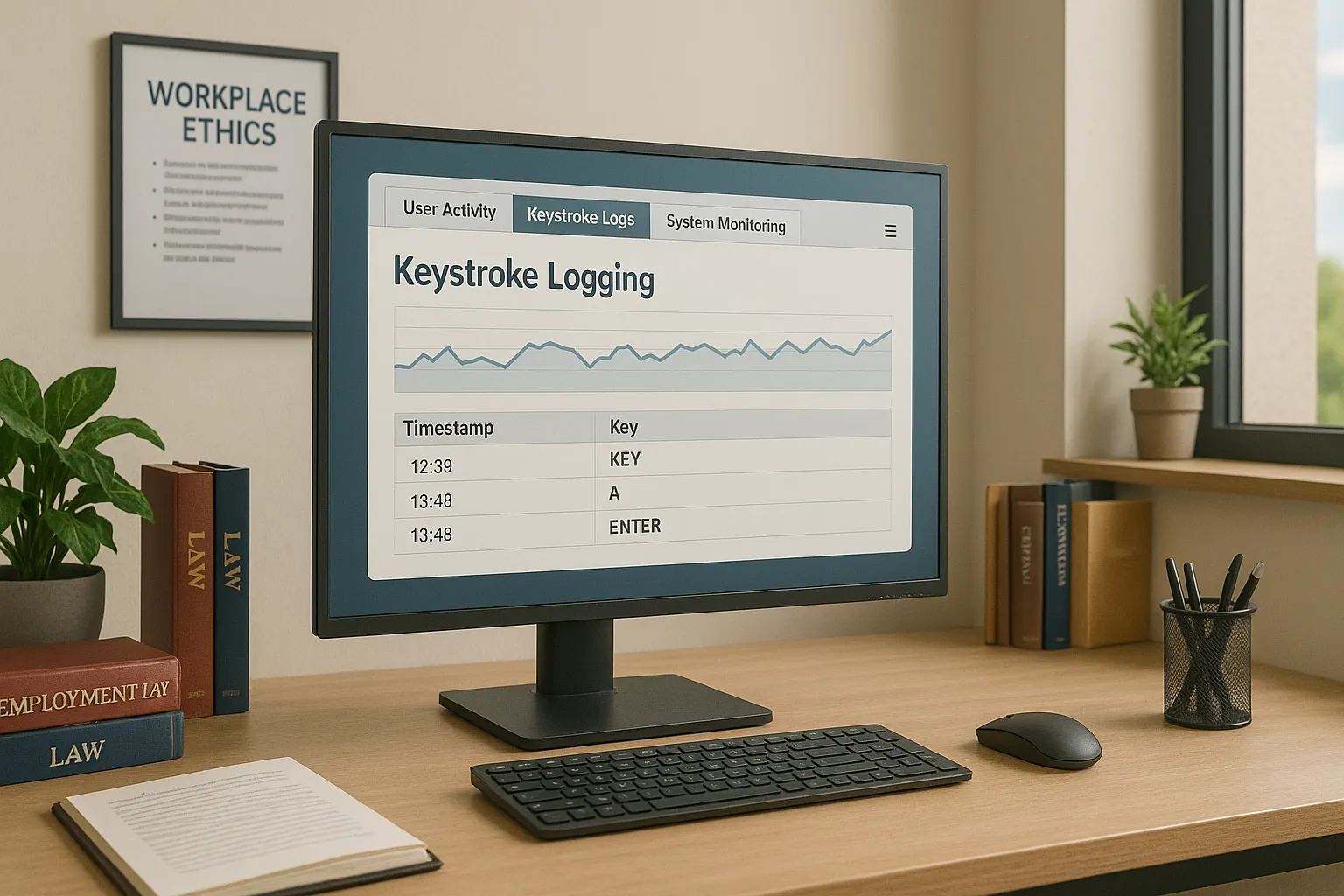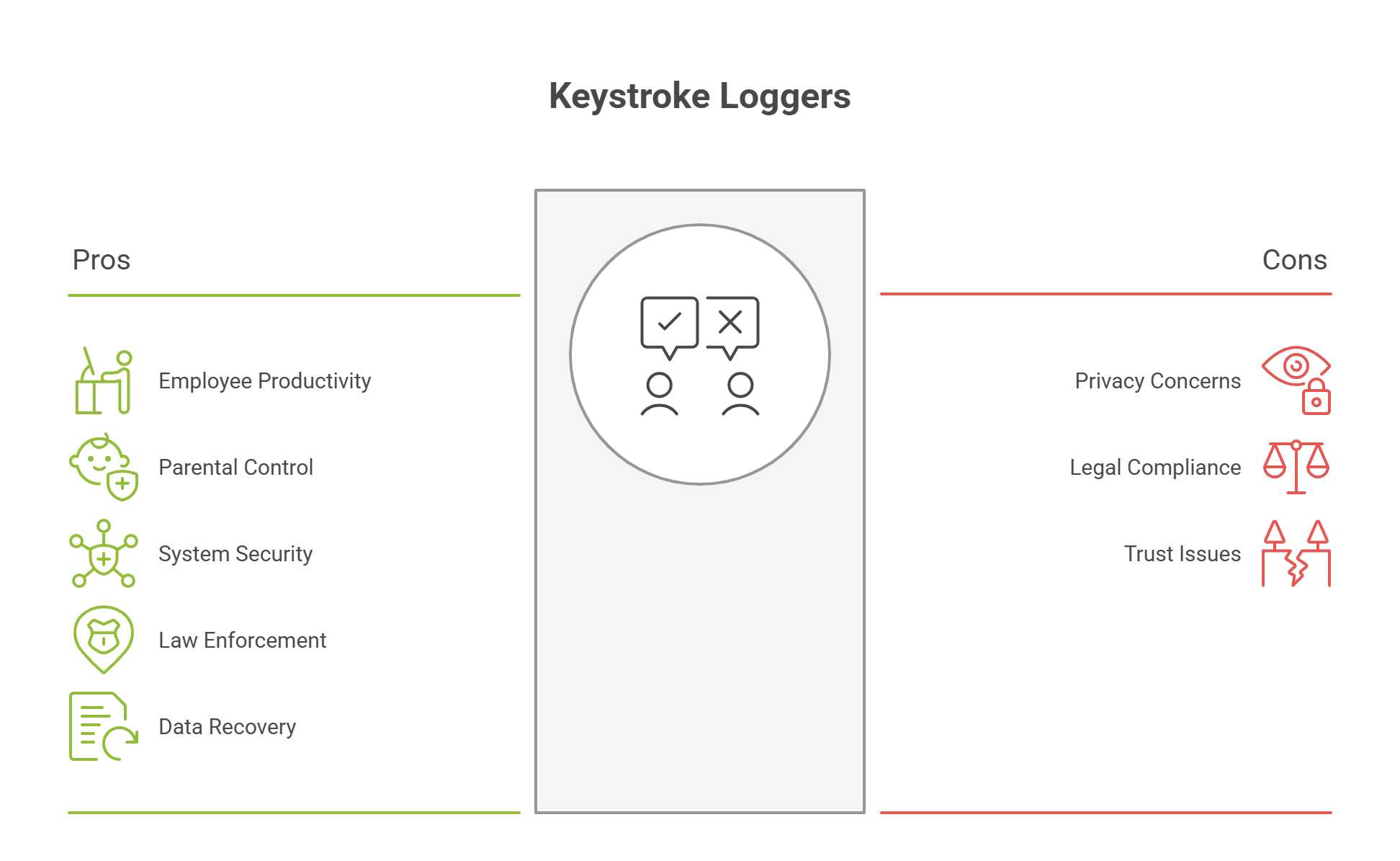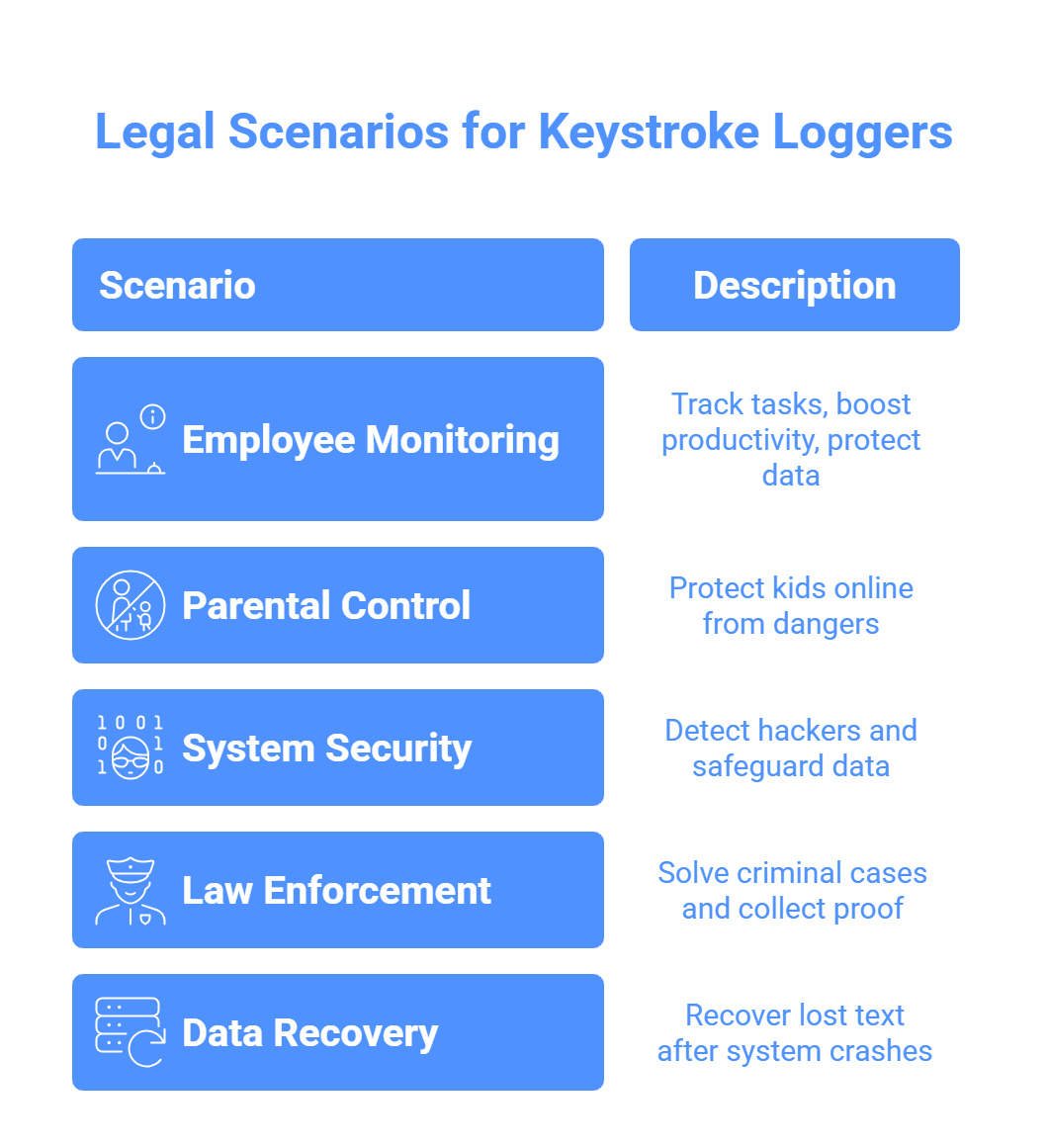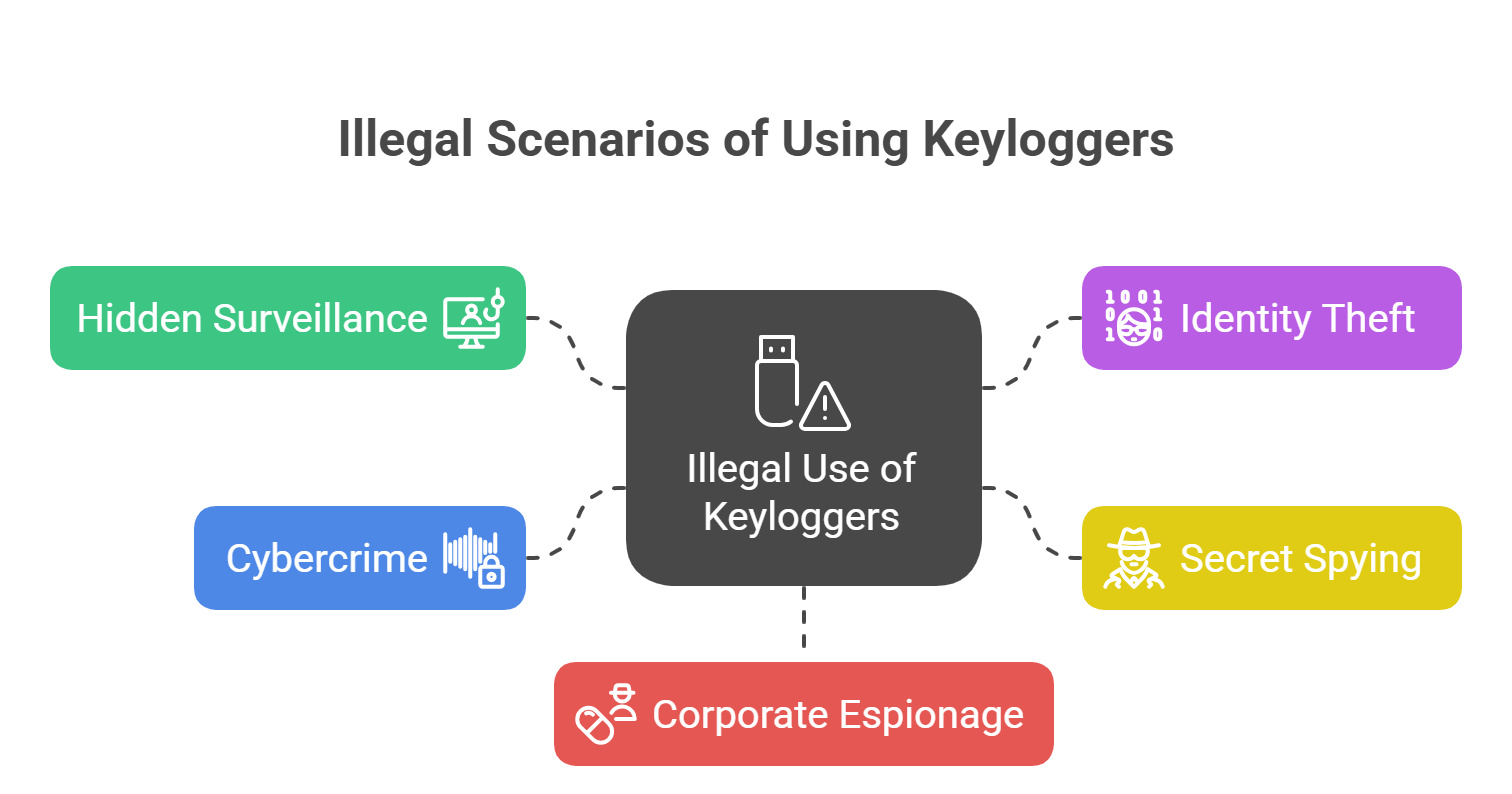Is Keystroke Logging Legal in Employee Monitoring? Here’s What the Law Says

Summary:
-
Keystroke tracking is allowed in the U.S. and EU for monitoring employees, but only under GDPR and ECPA rules governed by federal and state laws.
-
Employers mainly use it to increase productivity, improve security, and check for any suspicious actions in the workplace.
-
Employee monitoring, parental control, law enforcement, etc., are legal instances for a keystroke recorder.
With 24.5% of U.S. workers now working remotely full-time, employers seek ways to monitor efficiency. But you don't want to cross legal boundaries.
That brings up the question: Is keystroke logging legal in employee monitoring?
Well, it is legal to a certain extent under specific conditions.
However, any misuse of this technique can lead to million-dollar lawsuits, especially when privacy laws are not properly followed.
So, in this article, I will explore the legal perspective of keylogging in employee monitoring.
In this article
- Is keystroke logging legal?
- When keystroke tracking is legal
- When keystroke logging is illegal
- Popular keypress monitoring software
What is Keystroke Logging?
Keystroke capture, or keylogging, is a sneaky way to watch over what employees type. It is done through different monitoring tools. They record every single key you press on your computer or phone.
Some keylogger software runs secretly on your computer, while hardware keyloggers hide inside cables or USB sticks. Both see what you type with your virtual or physical keyboard. And some of them can capture screen contents as well.
Is It Legal to Use Keyloggers?
In the U.S., it’s legal for companies to use keystroke logging for employee monitoring.
And guess what? It is also permissible in the EU, except for Germany. But the rules are stricter here under data privacy laws.
For example, H&M was fined €35.3 million for excessive employee monitoring. [Source: BBC]
That said, you should inform your employees that you can monitor their work computer activity whenever needed. That is through established monitoring policies.
If there’s an official policy in place, remind them about it so they’re aware of workplace surveillance measures.

Remember, the Electronic Communications Privacy Act (ECPA), passed in 1986, generally stops people from intercepting private communications. Still, it includes exceptions for certain businesses like —
● Employer: If there’s a legitimate work reason, employers can check communications sent through company devices or networks.
● Service provider: They may view electronic communications if it’s necessary for operational duties.
The ECPA works together with the Wiretap Act and Ken Cox Stored Communications Act to establish comprehensive privacy laws just for electronic communications.
When implementing employee monitoring software on company-owned devices, employers must also consider Bring Your Own Device policies. Also, the National Labor Relations Act requirements.
Employee Monitoring Laws Explained
Legal Scenarios of Using Keystroke Loggers
Keystroke trackers are not always bad. Especially when used right, they can help protect people and systems. Here are a few legal use cases:

1. Employee Monitoring
Companies use keyloggers on work devices. That is to track tasks, boost productivity, and protect business data.
Monitoring practices also include internet activity and application usage observation. It ensures everything is in line with the organization's privacy laws.
This helps stop data leaks and enforces rules by addressing insider threat concerns at the same time.
But before this, employees must be informed to keep things transparent and build trust.
2. Parental Control
Parents use keyloggers to protect kids online from dangerous engagements. It shows what sites they visit and who they talk to. This includes social media accounts and internet usage.
3. System Security
Keyloggers help detect hackers and safeguard data. They are used to trace breaches and implement security measures. In the process, this kind of software records failed logins and alerts admins as soon as possible.
4. Law Enforcement
Police and other security forces can use keystroke loggers to solve criminal cases. So that they can collect proof. And in the meantime, they must meet the legal compliance requirements during the process.
For example, in 1999, FBI agents installed a keylogger during a physical search of Nicodemo Scarfo Jr.’s office. This is to capture his PGP password and decrypt files. [Source: Wired]
5. Data Recovery
Keyloggers help recover lost text. Say your PC crashes and files are lost. These brilliant tools save what was typed before everything went south.
Illegal Scenarios of Using Keystroke Loggers
Keyloggers, if used unethically, break laws. They invade privacy and steal data. Here’s a quick look at unlawful instances:

1. Hidden Surveillance
Installing keyloggers without consent is illegal. This is considered unauthorized surveillance.
Now the keystroke logger software tracks every word typed, passwords, chats, and employee emails. It’s spying, plain and simple.
Lisa M. Rene, an employee, sued her former employers due to hidden monitoring. They installed a keylogger software on the computer she used to access her personal email and checking accounts. They violated all privacy laws.
2. Identity Theft
Hackers use keyloggers to steal login info and credit card numbers, including email addresses. Then they pretend to be a different person. In the end, it will cause them to lose money or ruin their reputation.
3. Secret Spying
Some use keyloggers to spy on others. Private info for personal gain. That’s a crime.
Imagine a worker puts such software on someone else's computer. He does this in secret to steal passwords and usernames. Next, they read private emails. They also collect other personal information.
Why do they do this?
They may want to hurt their coworker. Or want to control them for their benefit.
This kind of spying is against the law. It breaks privacy and computer crime laws. People who do this can face serious legal trouble. They might end up in jail.
4. Cybercrime
You see, keyloggers are a heavenly tool for fraud. Hackers can grab your bank data and drain accounts. It’s part of a large online scam. And punishable by strict laws.
Like, hackers targeting executives in luxury hotels is a classic example. They had installed keystroke loggers through fake Wi‑Fi or update prompts.
The virus collected high-value credentials from Google, Facebook, Yahoo, and more. [Source: The Guardian]
5. Corporate Espionage
Stealing company secrets with keyloggers is a crime. It hurts businesses and breaks contracts. Big lawsuits and jail time can follow.
Take the cyber incident of UMMC as an example. In early 2025, a class-action lawsuit alleged that a pharmacist installed keylogging software on about 400 company devices.
He has done this over the span of ten years. It is reported that he spied on at least 80 staff, both at work and at home, including private webcam sessions.
This case, still under FBI investigation. This proves how the misuse of keyloggers can cause devastating consequences.
Ethical employee monitoring
Why Employers Use Keystroke Logging?
The following are the reasons employers mostly use keystroke logging tools for employee monitoring.
Track Productivity
To measure employee efficiency, some employers monitor keystrokes. This method reveals time-wasting behaviors like frequent social media use or browsing non-work websites by analyzing internet activity.
This is crucial as 36% of millennials or Gen Z spend more than 2 hours of their work time on the phone.
Plus, it ensures employees finish the tasks steadily instead of rushing right before deadlines.
For example, a manager could compare keystroke logs with project progress to confirm if a remote sales team is managing client data consistently.
Ultimately, they make sure employees stay productive during work hours, whether at home or in the office. If you need more than what Keypress monitoring offers, you could try employee productivity software instead.
It might be a better fit for you.
Prevent Data Theft
USD 4.9 million was the global average cost for a data breach in 2024. And 83% of organizations reported they experienced at least one insider attack in 2024 alone.
Now, these are alarming numbers.
Therefore, employing a keystroke logger can be the perfect preventive measure.
You’ll know how employees use keyboards to stop the unauthorized sharing of critical information and protect employee data. This includes:
- Client information
- Financial records
- Business data
- Proprietary codes
Besides, Keystroke tracker alerts teams if employees use sensitive words, find unapproved data access, and helps follow regulations.
Beyond that, it checks data input into critical software and blocks suspicious data transfers. This way, it reduces risks from both internal and external sources.
Reduce Time Wastage
Keystroke capture helps employers pinpoint habits that drain productivity via workplace surveillance. It finds time-consuming habits that reduce efficiency.
It includes tasks that take too much time, like entering data manually. Also, it could be when employees do non-work activities, such as shopping online instead of focusing on their jobs.
By reviewing these logs, you can identify and solve problems faster.
Suppose one of your employees spends too much time on repetitive Excel tasks. In that case, teaching them macros or time-saving software can help.
Eventually, it saves time on everyday work, helping your team to focus on important tasks.
That’s where Apploye excels by allowing you to see live data on how your team is spending their time on work.
Sign up for Apploye to decrease time-killer habits
Investigate Suspicious Activity
Keystroke logs find out misuse or security risks for employers. They track unauthorized activities, like when employees type sensitive words (such as “password” or "confidential"") or enter restricted systems.
If there’s a harassment complaint, the company can check messages sent through internal systems. So you can easily confirm if bullying or rule violations took place.
Best User Activity Monitoring Software
What are Some Keystroke Logging Tools?
Keyloggers help you track work, stop data leaks, and spot problems early. But you must follow the privacy regulations and inform your team first.
How Keylogging Hurts Your Company
Keylogging may seem smart, but it often backfires. It can break employee trust and lower team morale fast.
A study by the American Psychological Association found 56% of monitored workers feel stressed. And 40% remain normal as they are not monitored.
Such mental pressure can lead to poor performance and higher turnover. Plus, one wrong move with data handling can cause legal trouble.
For example, an Austrian grocery chain REWE international had to pay $9 million for breaking GDPR laws due to excessive monitoring. They collected sensitive employee information without consent.
Apploye: The Alternative to Keystroke Logging for Employee Monitoring
Looking for a transparent and efficient way to monitor remote workers? Apploye stands out as a top remote desktop monitoring software that respects privacy laws.
It includes automatic time tracking so you know exactly how long employees work on tasks. Plus, it takes periodic screenshots to show their activity. It also records the screen contents.
Additionally, Apploye registers the time spent on apps and websites. This approach is much simpler than keyboard spying, which can be time-consuming to analyze.
Even better, its productivity metrics (using keystrokes and mouse movements) give you accurate insights without the hassle of keylogging.
Use Apploye to monitor employees smartly
Final Words
So, is keystroke logging legal in employee monitoring? Yes, it is, as long as it adheres to established legal standards and your employees are clearly informed about these practices.
Till now, we’ve discussed how key press monitoring can boost both productivity and security, highlighting the importance of using it wisely. Moving forward, the key challenge will be to balance effectiveness with respect for privacy.
Here, Apploye can be a less invasive monitoring practice option. It supports effective productivity tracking in a way that respects your privacy, ensuring a reliable and efficient workplace without feeling overly monitored.
Switch to Apploye for ethical employee monitoring
Frequently Asked Questions About Keystroke Logging in Employee Monitoring
Do employers have the right to log keystrokes on my personal devices?
It’s legal to monitor employees' personal computers under specific conditions, such as with a court order or clear company policies within the workplace. The Fourth Amendment restricts such monitoring by government employers. However, it doesn’t apply in the private sectors.
Is it required to tell employees about monitoring?
In many regions, including certain U.S. states and the entire EU under GDPR, it’s required to inform employees about monitoring. Even where not mandated, transparency is considered best practice.
Are employees allowed to turn off keystroke logging software?
Now, employees aren’t generally allowed to disable keystroke logging software unless specifically permitted by company policy. In fact, unauthorized attempts to disable such software could violate employment agreements.
What are the legal restrictions on workplace monitoring?
In the U.S., the Electronic Communications Privacy Act (ECPA) allows employers to monitor communications on company-owned systems for legitimate business reasons if employees are informed. In the EU, the GDPR requires transparency, clear consent, and data minimization.
Are companies allowed to track keystrokes?
Yes, companies are generally allowed to track keystrokes on company-owned devices, especially when employees are notified. This is often done to ensure productivity, data security, and operational compliance. But it must follow applicable laws like the ECPA in the U.S. and the GDPR in the EU.
Is it legal for my employer to monitor my computer?
Yes, it is legal for your employer to monitor your work computer. Especially if the device is company-owned. Also, if you've been informed of the monitoring policy.
Can employers log keystrokes?
Yes, employers can log keystrokes on company-owned devices, especially if it's stated in their monitoring policy. And employees are informed.
What is the line of legality of hardware keyloggers?
Hardware keyloggers are legal when used for authorized monitoring on company-owned devices and with informed consent. Installing them secretly on someone else’s personal device crosses legal boundaries and can be considered unlawful surveillance.
How common is keystroke monitoring in companies?
Keystroke monitoring is increasingly common, especially in remote work environments. Surveys suggest that over 60% of employers use some form of digital user activity tracking, with keystroke recorders being a part of broader monitoring strategies.

